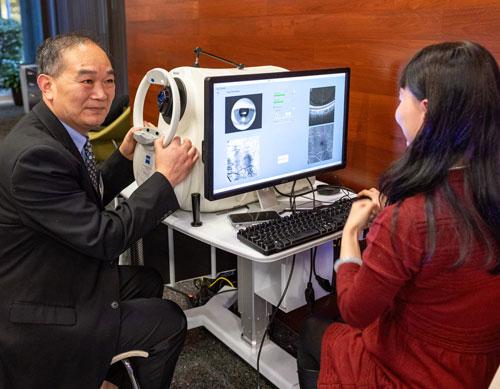
Ricky Wang, PhD to receive recognition from SPIE
Ricky Wang, PhD, George and Martina Kren Endowed Chair in Ophthalmology Research and Professor of Bioengineering and Ophthalmology, will be honored with the 2025 SPIE Britton Chance Biomedical Optics Award.
The award is given by SPIE, the International Society for Optics and Photonics, in recognition of Dr. Wang’s “transformative advances in biophotonics and imaging that have significantly enhanced the diagnosis and monitoring of diseases, thereby improving patient quality of life.”
Dr. Wang is known for his significant work in biomedical optics and imaging, notably inventing optical coherence tomography angiography (OCTA). This revolutionary technique allows non-invasive 3D visualization of blood flow, now widely adopted in clinical ophthalmology, making a meaningful impact on saving patient vision.
He has published extensively on this topic, including demonstrations of the use of OCTA to capture images of retinal, cerebral cortical, cochlear, and skin blood flow, and the oral cavity, without the need for contrasting dyes. He has further enriched the field by developing advanced OCT imaging technologies such as phase-sensitive OCT, complex-full-range imaging, and optical coherence elastography, pushing the boundaries of these technologies in both clinical settings and research.
His laboratory has also made significant contributions to the development of smartphone-based healthcare, inventing a low-cost technique to create hyperspectral imaging on unmodified smartphones, illustrating a deep commitment to improving patient outcomes and advancing medical science.
An SPIE Fellow, Wang has served the Society in numerous capacities, including organizing and chairing conferences at SPIE BiOS and Photonics Asia and as a reviewer and contributing author for SPIE’s Journal of Biomedical Optics (JBO), Optical Engineering, and Neurophotonics. In 2023, Wang received the UW Medicine Inventor of the Year Award, which recognizes outstanding university scientists whose inventions have had a major impact on both human health and the local economy.
“He is a pioneering figure in the field of biomedical optics, with a profound impact on both scientific advancements and healthcare outcomes,” said Lihong Wang, Bren Professor of Medical and Electrical Engineering and Director of the Optical Imaging Laboratory at Caltech. “Over a span of 25 years, Dr. Wang has contributed significantly to the development of novel imaging technologies, including OCT, laser speckle/Doppler imaging, and tissue optics. His innovations have led to functional imaging based on hemodynamics and early disease detection, with a particular focus on improving patient quality of life. Overall, his expertise and impact have significantly advanced scientific knowledge and improved healthcare outcomes, cementing his legacy as a leader in the field.”
About SPIE
SPIE, the International Society for Optics and Photonics, brings engineers, scientists, students, and business professionals together to advance light-based science and technology. The Society, founded in 1955, connects and engages with our global constituency through industry-leading conferences and exhibitions, publications of conference proceedings, books, and journals in the SPIE Digital Library, and career-building opportunities. Over the past five years, we have invested more than $25 million in the international optics community through our advocacy and support, including scholarships, educational resources, travel grants, endowed gifts, and public policy development. www.spie.org.
